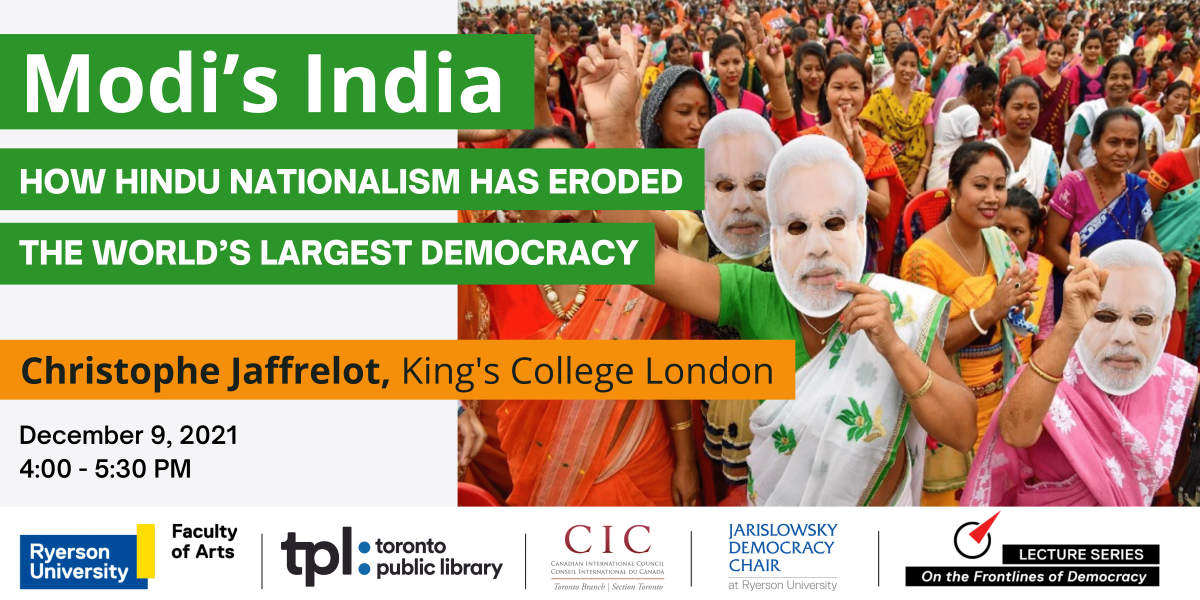On the Frontlines of Democracy: Modi’s India: how Hindu nationalism has eroded the world’s largest democracy
- Date
- December 09, 2021
- Time
- 4:00 PM EST - 5:30 PM EST
- Location
- Online
 (external link)
(external link)
India has long stood out as the most unlikely democracy in the world. Two centuries of British colonial rule had deepened absolute poverty, social inequalities and religious conflicts. Yet the secular 1950 Constitution granted universal adult suffrage, codified a wide range of civil liberties and political rights, and institutionalized many checks across a sprawling federal parliamentary democracy. Parties transferred power, and historically marginalized groups voted in ever greater numbers, with increasing frequency. Conflict and destitution remained serious challenges. Nonetheless, the persistence of the world’s largest democracy attracted widespread attention, offering a striking counterpoint to communist China.
The rise to power of the Bharatiya Janata Party since 2014, however, has deeply challenged its foundations. Militant Hindu nationalism has polarized the electorate along ethno-religious lines in an effort to redefine a secular model of citizenship. Populism has undermined the independence and autonomy of public institutions and civil society. And growing intimidation of and violence towards political opponents and minority communities has sown fear into the lives of many. What explains this sudden transformation? Why do so many citizens in India continue to support the leader of the BJP, Prime Minister Narendra Modi, despite the failures of his government to realize its promise of rapid economic modernization? And what are the ramifications of these changes for democracy in India and its standing in the world?
The distinguished political sociologist, Christophe Jaffrelot, explores these questions in conversation with Sanjay Ruparelia.
A special collaboration between Ryerson University, Faculty of Arts, and the Toronto Public Library.
This event is co-sponsored by The Canadian International Council (CIC)Toronto Branch (external link) . The CIC is Canada’s foreign relations council; a non-partisan membership organization dedicated to advancing constructive dialogue on Canada’s place in the world and providing innovative ideas on how to address the world’s most pressing problems.
About the speaker and discussant:
Christophe Jaffrelot is Avantha Chair and Professor of Indian Politics and Sociology at the India Institute and the Research Lead for the Global Institutes at King’s College London, and an Overseas Fellow at the Carnegie Endowment for International Peace. A graduate of the University of Paris I-Sorbonne, École des Hautes Études en Sciences Sociales and Sciences Po in France, where he was Director of Centre d’Etudes et de Recherches Internationales (CERI) from 2000 and 2008 and continues to teach South Asian politics and history.
Jaffrelot joined the National Center for Scientific Research (CNRS) in 1991 and was awarded the CNRS bronze medal in 1993. In 2002, he became a CNRS senior research fellow of second class, and a senior research fellow of first class in 2008. In 2014, he was awarded the Ramnath Goenka Award for Excellence in Journalism in commentary/interpretive writing in India.
A prolific scholar, Jaffrelot is the author of six books and editor of seventeen volumes, whose topics range from Hindu nationalism, the transformation of caste and the workings of democracy in India, to the politics of ethnicity, regime change and statebuilding in Pakistan and South Asia more broadly. He is also a frequent commentator in the media in India, South Asia and Europe, including a regular column for The Indian Express and Caravan. His most recent book, just published, is Modi's India: Hindu Nationalism and the Rise of Ethnic Democracy (Princeton University Press).
Sanjay Ruparelia is the Jarislowsky Democracy Chair, and an Associate Professor of Politics, at Ryerson University. He is the author of Divided We Govern: Coalition Politics in Modern India (2015), editor of The Indian Ideology (2016), and co-editor of Understanding India's New Political Economy: A Great Transformation? (2011). Sanjay is a co-chair of the Participedia network (participedia.net), associate editor of Pacific Affairs and country expert for V-Dem: the Varieties of Democracy Project (Sweden). He previously taught at Columbia University and the New School for Social Research, served as a consultant to the Asia Foundation (Kabul), United Nations Development Programme (New York) and United Nations Research Institute for Social Development (Geneva), and was a fellow at Notre Dame, Princeton and Yale. He earned his B.A. from McGill University, and M.Phil and Ph.D. from the University of Cambridge.
About the series:
On the Frontlines of Democracy is a public lecture series to analyze the prospects of democracy in our world. In every region, democracies face serious challenges, old and new. Can we protect our constitutional democracies in an era of popular mistrust, severe partisanship and resurgent nationalism? Can they reduce inequalities of power, wealth and status, defend deep diversity and confront climate change in the new digital age? Can we develop innovative strategies to revitalize civic engagement and empower public institutions to renew the promise of collective self-rule? And what can Canada offer, learn and do to promote the prospects of democracy, in a spirit of mutual learning, in our increasingly post-western world?